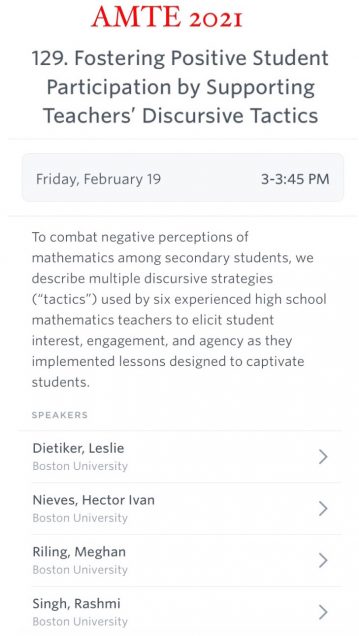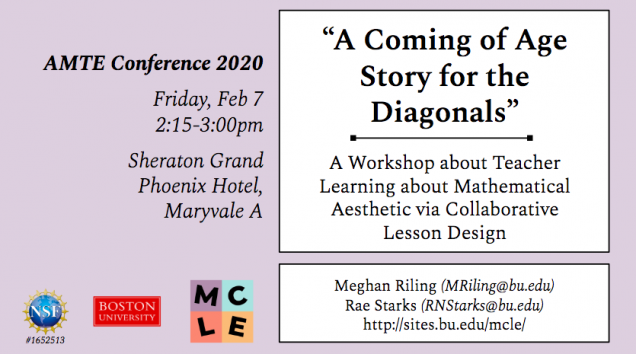Papers and Presentations
As the project continues, we will post papers and presentations here.
PME-NA 42 – What Makes a Mathematics Lesson Interesting to Students?
Research report by Leslie Dietiker, Rashmi Singh, Meghan Riling, and Hector I. Nieves.
How can we design mathematical lessons that spark student interest? To answer this, we analyzed teacher-designed and enacted lessons that students described as interesting for how the content unfolded. When compared to those the same students described as uninteresting, multiple distinguishing characteristics are evident, such as the presence of misdirection, mathematical questions that remain unanswered for extended time, and a greater number of questions that are unanswered at each point of the lesson. Low-interest lessons did not contain many special narrative features and mostly had questions that were answered immediately. Our findings offer guidance for the design of lessons that can shift student mathematical dispositions.
PME-NA 42 – Characterizing Coherence within Enacted Mathematics Lessons
Research brief report by Jaepil Han, Meghan Riling, Hector I. Nieves, Leslie Dietiker, and Rashmi Singh.
The importance of curricular coherence has been emphasized by leaders in mathematics education, who explain that coherence enhances deeper understanding by enabling students to see connections between mathematical ideas. Although there are different forms of curricular coherence in teaching and learning mathematics, the coherence within a lesson has received considerably less attention. In particular, little is known about what constitutes coherent lessons or how to measure the degree of coherence. Using lesson data from a larger study in which lessons are intentionally designed for coherence, we propose a tool for examining lesson coherence and describe characteristics of the lessons with different levels of coherence.
PME-NA 42 – Student Inquiry in Interesting Lessons
Poster by Hector I. Nieves, Rashmi Singh, and Leslie Dietiker
What impact, if any, do interesting lessons have on the types of questions students ask? We analyzed 145 student questions from 12 lessons, developing a rubric of student questions: factual, procedural, reasoning, and exploratory. Initial results suggest high-interest lessons contain more exploratory questions, and had more student questions arise during whole class discussion.
MCLE at AMTE 2021 – virtual!

The MCLE team will be presenting at AMTE 2021!
Presentation title: Fostering Positive Student Participation by Supporting Teachers' Discursive Tactics
Time: Friday, Feb 19, 3:00-3:45pm
To combat negative perceptions of mathematics among secondary students, we describe multiple discursive strategies ("tactics") used by six experienced high school mathematics teachers to elicit student interest, engagement, and agency as they implemented lessons designed to captivate students.
During the workshop, we will be sharing clips from high school lessons for workshop attendees to watch and discuss.
MCLE Presents Results at NSF CADRE Conference
The MCLE team presented a poster for the NSF CADRE Conference that describes the results of 4 years of research. In it, an overview of the MCLE design approach, using the mathematical story framework, is given. In addition, the comparison data for 8 classrooms (for 6 high school teachers across 3 different schools) is provided, showing how there was an improvement in student experiences in nearly all classes. Also provided: an example of the difference in the structure of content between MCLEs and non-MCLEs, the impact on questioning (both teacher and student) in MCLEs when compared to non-MCLEs, and an analysis of the characteristics of the content that differ between MCLEs and non-MCLEs. Check it out!
Student Engagement in MCLEs
Undergraduate research team member Sarina Simons recently shared her analysis of student engagement during MCLEs.
Engagement in a classroom is always a topic of conversation in a math classroom. Over the course of the semester, I observed two lessons in six public high school math classrooms, with the goal of isolating key characteristics of a high engagement math class. The purpose of this study is to observe the lessons and analyze student interviews and post surveys to better understand the differences in students engagement in MCLEs and Non-MCLEs. I noticed that students were generally more engaged in the MCLE lessons than the lessons that were randomly selected in the same classes (non-MCLE). After listening to student interviews and analyzing post-class surveys, I recognized that the Mathematics Story Framework is the key to students being engaged in the classroom. Students were curious and therefore able to understand more in the MCLE classes because of its contrast to the routine classroom notes. Based on this evidence, teachers should adopt these MCLE lessons because they provide experiential learning which allows students to be more engaged and better understand the topic.
New findings will soon be available
Our project team is publishing two sets of findings as part of the proceedings of the Psychology of Mathematics Education - North American Chapter (PME-NA) organization. Although the conference has been rescheduled to occur in Spring 2021, the research report What makes a mathematics lesson interesting to students? (authors Leslie Dietiker, Rashmi Singh, Meghan Riling, & Hector I. Nieves) and brief research report Characterizing coherence within enacted mathematics lessons (authors Jaepil Han, Meghan Riling, Hector I. Nieves, Leslie Dietiker, and Rashmi Singh) will be published soon. Check back soon as we will update the website with final publications shortly!
MCLE workshop at AMTE 2020
During this workshop, participants will get the chance to explore the various aesthetics that can be experienced while doing mathematics, get to know one of the MCLE lessons and discuss how it can be thought of as a story, and examine teachers' design processes in order to think about how they enabled teachers to design a captivating lesson and to develop aesthetic mathematical knowledge for teaching.

MCLE Project presentation at PME-NA 2019 in St. Louis, MO
The Impact of Mathematically Captivating Learning Experiences
Research suggests that secondary students often do not have positive experiences with mathematics. To address this challenge, this research report shares findings of a design-based research project in which researchers and teachers use a mathematical story framework to design and test mathematically captivating lesson experiences (“MCLEs”) for high school students. On average, students reported improved experiences in MCLEs, as compared to randomly-selected lessons that were taught in the same class. This impact is strongest for students already captivated by mathematics, but does not differ by gender. The MCLEs also impacted the aesthetic experience described by students. These findings provide evidence that designing lessons as mathematical stories shows promise and can offer students opportunities to experience mathematics in ways they describe as intriguing and suspenseful.
To cite:
MCLE teachers lead workshop at NCTM Boston Regional Conference
Captivating students WITH mathematics: Boston area teachers share their lesson designs
Friday, Sept 27 - 8:00-9:15am
Hynes Convention Center, room 207
High school teachers from the Boston region will introduce how they plan and enact "mathematical stories"--lessons designed to spur student curiosity, captivate students with complex mathematical content, and compel students to engage and persevere. Participants will learn strategies to enhance the aesthetic opportunities of their lessons.